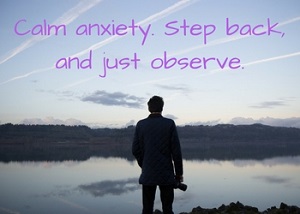Calm Anxiety Now -- Step Back and Observe

When you're caught in the roiling storm of anxiety, often the best way to calm that anxiety is to step back and observe. The fear, worry, and apprehension that are part of anxiety can become strong and debilitating when we're up close and personal with an anxiety-provoking situation. Why do we need to step back and observe when our anxiety is intense, and how do we do it?
Why It's Good to Step Back and Observe to Calm Anxiety
Anxiety has a way of sucking us in. Anxiety pulls us close to worry- and fear-provoking situations because the closer we are to a troublesome situation, the stronger our anxiety becomes.
For example, someone might fear failure in a relationship or at work. Once that anxiety begins, it works its way deep inside, making his thoughts race with worry. The more his thoughts are consumed with anxiety, the stronger his negative emotions become, creating feelings like anger, jealousy, self-hatred, despair, and more (Anxiety and Over-Thinking Everything). His behaviors could very well change because of this anxiety and fear of failure; perhaps he becomes paralyzed by his fears, unable to start projects at work or initiate activities with his partner. Or he might be able to take action, but fear and anxiety make him question himself, miss deadlines, apologize too much, and more.
His anxiety continues to skyrocket, and because he's immersed in his situation, his thoughts continue to race, his emotions spiral out of control, he struggles with anxiety's physical symptoms, and he just can't calm his anxiety. He needs to step back and observe.
When we're in the middle of struggling against anxiety, staying with the anxiety by thinking about it, feeling it, and cursing it can only serve to worsen it because what we pay attention to grows. Therefore, it's important to step back from anxiety and be a distant observer.
How to Calm Anxiety by Stepping Back and Observing
 An important clarification is in order: stepping back isn't the same thing as running away or avoiding. Avoidance doesn't work to reduce anxiety; no matter how much we ignore problems in our world, we can't ignore them fully because they stay with us in our mind (Living with the Cycle of Anxious-Avoidance: Trying to Get Out). Stepping back, therefore, involves not ignoring or running away but putting some metaphorical distance between yourself and the anxiety-provoking problem.
An important clarification is in order: stepping back isn't the same thing as running away or avoiding. Avoidance doesn't work to reduce anxiety; no matter how much we ignore problems in our world, we can't ignore them fully because they stay with us in our mind (Living with the Cycle of Anxious-Avoidance: Trying to Get Out). Stepping back, therefore, involves not ignoring or running away but putting some metaphorical distance between yourself and the anxiety-provoking problem.
When caught up in anxiety, we often feel stressed, nervous, apprehensive, and worried. Our thoughts race with anxiety, and our minds are stuck in negative thought patterns, pelting us with "what-ifs," "shoulds," all-or-nothing thinking, and other thought traps. We're so close to the situation that is causing anxiety that it's hard to see the big picture. We can't see the forest when we're standing against a single tree staring at its trunk. To calm anxiety, we need to back up so we can see the whole picture.
You might want to try these simple steps to step back, observe, and calm anxiety:
- Imagine that you're someone you respect. I have a mentor and former teaching partner that I admire, and I envision what he would think and do in an anxiety-provoking situation.
- Use an imaginary wide-angle lens to take in the big picture. If it's a work project that's making you anxious because of the threat of failure, look beyond the project. What other projects have you done well? Why do you have the project/what skills does the boss perceive? What else do you do in your job? If you do fail at this project, what might happen and how will you deal with the consequences?
- Observe neutrally. Pretend you are a neutral party just watching a show about anxiety. You don't know the characters in this story, nor do you have a stake in the outcome. Also, observe this situation and its outcome with the distant perspective that this is just one drop in the gigantic bucket of your life. The drop will plunk into your bucket, cause some ripples, and the drop will merge with the rest if the "water," the ripples will settle, and your life will continue.
To calm anxiety, step back and observe your situation neutrally. This doesn't change the situation, but it does positively affect how you think and feel about it. It can calm anxiety and help you deal with what you need to address.
In the below video, I share an experience I had, one where I realized that stepping back and observing helps calm anxiety. I invite you to tune in.
Let's connect. I blog here. Find me on Facebook, Twitter, LinkedIn, Instagram, and Pinterest. My self-help book and mental health novels, including one about severe anxiety, are here.
APA Reference
Peterson, T.
(2017, January 26). Calm Anxiety Now -- Step Back and Observe, HealthyPlace. Retrieved
on 2026, January 19 from https://www.healthyplace.com/blogs/anxiety-schmanxiety/2017/01/to-calm-anxiety-step-back-and-observe
Author: Tanya J. Peterson, MS, NCC, DAIS
Excessive worry is what keeps my anxiety going. I worry all the time. How does one get rid of excessive worry?
I am also 'immersed in the situation' constantly. I might as well be living it because that is what my brain and body experiences. It is not reality, but you throw yourself into that situation as if it is real so you might as well be living it. A person must deal with that and throw it away as fast as possible.
Also your 'minds in the negative thought patterns' is with me all day. I couldn't think positive for one minute. I am always thinking the worst outcome. That affects your attitude. It also develops paranoia.
The Step Back and Observe approach can help. This past summer, I started hiking up a relatively steep trail that is part of an extinct volcano here in Idaho. At the top the views are serene. It takes you a step away from it all. Now that we have winter I am missing the therapy from those weekly hikes. This spring I will start them again. When going up a steep trail your mind is 100% off your anxiety and fully focused on the trail.
I have anxiety real bad. Mainly about being done wrong by the one I love , being left and death. My mother left when I was a teen and she was very mentally abusive to me and then I got into relationships like that. For the last 4 years I have got away from that. I am now In a relationship were he treats me good and is not abusive and shows respect but I freak if his phone even rings and thinks the worse. I'm always over thinking everything and afraid of being hurt again ( cheated on and left) that I panic and go into fight or flight mode over nothing. I talk to him about it but he isn't very easy to talk to about feeling stuff.he always talkse out of the flight and fight mode but I am driving myself crazy and so afraid I am going to ruin this by my anxiety. If you could give me some advice I would appreciate it. I'm a fighter and have been fighting anxiety my whole life it seems but now that I'm in a good place it seems to be worse. I'm always waiting for my fears to happen and it is not fair to the one who really loves me. All ever wanted was real love and now that I got the best thing I ever had I am to busy panicking to enjoy it. Please help. Thanks Kimberly
Hi Kimberly,
You're not alone in this. Anxiety around relationships, being hurt or abandoned, and more is quite common. You have past relationships and situations that are getting in the way of yoru present happiness. Memories of negative experiences that increase anxiety are called triggers. Reactions from the past barge into present relationships, thus increasing anxiety. You might find some helpful information in these articles:
Ways to Manage Anxiety in Love Relationships (http://www.healthyplace.com/blogs/treatinganxiety/2015/05/ways-to-manage-anxiety-in-love-…)
Triggers Can Make Anxiety and PTSD Flare Up (http://www.healthyplace.com/blogs/anxiety-schmanxiety/2014/04/triggers-can-make-anxiety-p…)
Fear of Losing Someone You Love (http://www.healthyplace.com/blogs/anxiety-schmanxiety/2012/11/fear-of-losing-someone-you-…)